Infinite Chess online panel discussion for chess teachers and tutors announced

Online panel discussion for chess teachers and tutors, “Chess for children with an autism spectrum disorder. Learn and teach”, will take place on August 24, 2024, between 13:00 and 15:00 CEST. The main goal of the discussion is to share the partners’ experiences and ask the most challenging questions while implementing the project. The conference will be held online via Zoom. Zoom link: https://us06web.zoom.us/j/86838350771?pwd=dp6ZLMwpCLNr1aq0NHLad8KpbSEBM0.1 Meeting ID: 868 3835 0771 Passcode: 11862 Schedule of the event 13:00 – welcome speech by Dana Reizniece-Ozola, Project supervisor, Deputy Chair of FIDE Management Board 13:05 – welcome speech by the Anastasia Sorokina, Leader of the project, FIDE WOM Chair 13:10 – Educational program benefits: field insights (Sharon Whatley, Gibraltar) 13:20 – Questions & Feedback 13:30 – Frequent challenges: behavior, emotions regulations, discipline (Evguenia Charomova, New Zealand) 13:40 – Questions & Feedback 13:50 – Parental support & social acknowledgement, stigmatization (Melodi Dincel, Turkey) 14:00 – Questions & Feedback 14:10 – Social project funding: search, tricks and increase (Pep Suarez, Menorca, Spain) 14:20 – Questions & Feedback 14:30 – Roadmap update: 6 stage of the project: Sep-Dec, 2024 (Maria Tamkovich, project coordinator, FIDE) 14:40 – Questions & Feedback Panel discussion agenda About Infinite Chess Project FIDE INFINITE CHESS Project aims to increase knowledge and awareness of chess for children with autism spectrum disorder (ASD), give practical advice to teachers and parents, study the benefits of introducing to chess and develop various teaching methods. Supported by FIDE and IOC the pilot project went global in 2021 and thrives in 19 countries for more than 150 children with ASD. Each year Infinite Chess team organizes Educational Seminars “Chess for children with ASD. Learn and teach”. The main goal of this seminar is to provide core knowledge and practical advice for teachers, trainers, and parents who wish to teach chess to kids with autism. The first educational program “Methodological guide for teachers” is available in English, French, Spanish, Russian, Arabic. Official website: infinitechess.fide.com/
FIDE Council meeting July 21 and 29, 2024: List of decisions
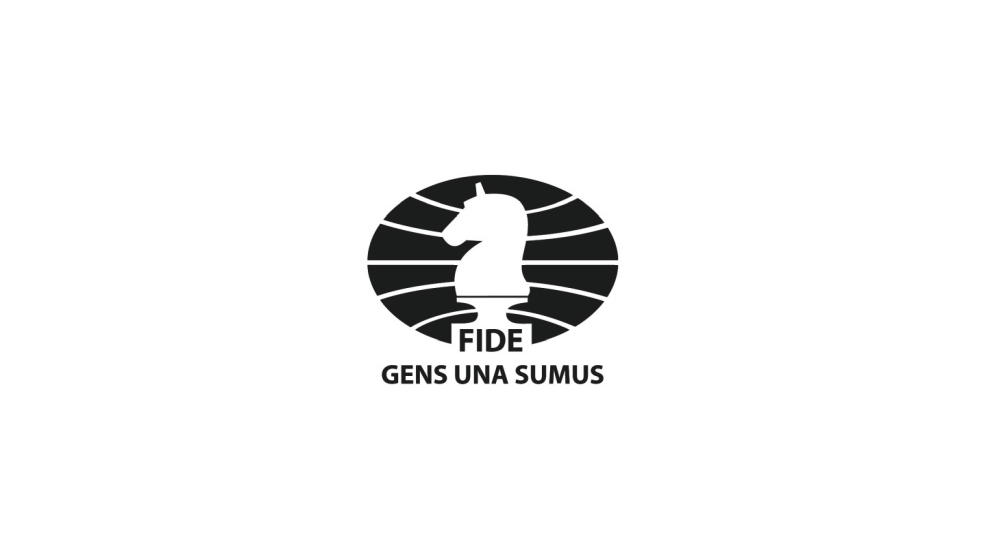
CM2-2024/01 To note President’s report. CM2-2024/02 To approve Treasurer’s report. CM2-2024/03 To approve Recommendation of Verification Commission on suspension of member federations in arrears, Burkina Faso and Rwanda. CM2-2024/04 To appoint Mr. Nigel Short as a reverse delegate for the Burkina Faso Chess Federation effective from July 29, 2024 with the period of his mandate till September 30, 2024. To authorize the reverse delegate within his mandate: – to evaluate and send FIDE requests about FIDE titles, ratings, events; – to select and register the team for the FIDE Chess Olympiad 2024, as well as to liaise all related matters; – to liaise with national authorities, facilitating the solution of internal matters CM2-2024/05 To note the report of Mr. V. Bologan in respect of the situation in Bosnia and Herzegovina Chess Union. CM2-2024/06 To note the report of Mrs. D. Reizniece-Ozola in respect of the preparations for the Chess Olympiad 2024 and FIDE Congress 2024 in Budapest, Hungary. CM2-2024/07 To approve the updated Regulations for the Women’s Grand Prix 2024. CM2-2024/08 To note the Global Strategy Commission’s report. CM2-2024/09 To approve the Global Strategy Commission’s proposal in respect of Appeals Committee Procedural Rules. Table of Changes CM2-2024/10 To note the Arbiters’ Commission’s report. CM2-2024/11 To approve the recommendations of the Arbiters’ Commission on Seminars, Classification upgrades, Amendments to the lecturer list, FA norms and titles. CM2-2024/12 To approve the Arbiters’ Commission’s proposal in respect of the changes in the ARB report forms. Table of Changes CM2-2024/13 To approve the recommendations of the Qualification Commission on titles. CM2-2024/14 To note the Chess in Education Commission’s report. CM2-2024/15 To approve the recommendations of the Chess in Education Commission on titles. CM2-2024/16 To approve the Chess in Education Commission’s proposal in respect of the award of the Senior SLI titles on an expertise basis. Table of Changes CM2-2024/17 To approve the Technical Commission’s proposal in respect of the endorsement of Leap Clock model KK 9909 for official use. CM2-2024/18 To approve the Technical Commission’s proposal in respect of Play-off and tiebreak regulations. Table of changes CM2-2024/19 To approve the Technical Commission’s proposal in respect of Swiss Pairing System Rules. CM2-2024/20 To approve the recommendations of the Trainers’ Commission on titles and Academies. CM2-2024/21 To approve the recommendations of the Events Commission on titles. CM2-2024/22 To approve the Events Commission’s proposal to replace FIDE World School Individual Championship with FIDE World Championships under 7-17 and rename FIDE World Championship under 8-12 in principle, starting from 2026, and to request the Commission to finalize the respective Regulations. CM2-2024/23 To note the Fair Play Commission’s report. CM2-2024/24 To approve the Fair Play Commission’s proposal in respect of FIDE Fair Play Definitions. CM2-2024/25 To approve the Fair Play Commission’s proposal in respect of FIDE Fair Play title regulations. Table of Changes CM2-2024/26 To refer the proposals of the Fair Play Commission related to: FPL Appointment Regulations, FPL Financial Regulations and Fair Play Regulations, back to the Commission to be updated based on the feedback received from the FIDE Council. To request the Commission to submit the updated documents to the Management Board and the FIDE Council. CM2-2024/27 To note the Commission’s for Women’s Chess report. CM2-2024/28 To note the Rules Commission’s report. CM2-2024/29 To approve the Rules Commission’s proposal in respect of video assistance system for tournaments. CM2-2024/30 To note the Chess in Multi Sports Games Committee’s report. CM2-2024/31 To note Continental Presidents’ reports. CM2-2024/32 To recommend to the General Assembly to ratify the Greenlandic Chess Federation application as a FIDE Affiliated Member. CM2-2024/33 To note the position of the Chess Federation of Canada with respect to the proposed affiliation of the Quebec Chess Federation with FIDE. CM2-2024/34 To continue the discussion regarding the proposal of the delegate of the Irish Chess Union Mr. O’Connor in respect of the best score prizes for the Olympiad. CM2-2024/35 To take note of the proposal of the FIDE Historical Committee in respect of the FIDE Awards. FIDE Council members to provide their opinions to reach the FIDE Office by August 12, 2024. CM2-2024/36 To note the update regarding FIDE 100 Years Anniversary. CM2-2024/37 To request the advisory opinion of the Constitutional Commission regarding a number of proposals to the General Assembly Agenda. CM2-2024/38 To approve the Resolution regarding proposals on amendments to the Charter. CM2-2024/39 To hold the 2024 3rd FIDE Council meeting in Budapest, Hungary, during the FIDE Congress 2024.
FIDE 100 Celebrations in Quebec City

Text and photos by WGM Anna Burtasova In April, alongside the FIDE Candidates, the centenary celebrations of the International Chess Federation took place in Toronto. In August, the festivities moved to another part of Canada, the historic Quebec City. Founded in 1608 by explorer Samuel de Champlain, Quebec City is unique in North America with its fortifications, narrow streets, and 400 years of architecture. Besieged five times, it was finally conquered by the British in 1759. Initially the capital of New France, then of British North America, it is now the heart of French culture on the continent. The Royal 22nd Regiment hosted a beautiful ceremony at the Citadelle of Quebec, part of the city’s fortifications, on Sunday, August 18. The event began with a torch relay for the Chess Olympiad, which starts in less than a month in Budapest. Members of the Regiment carried the torch through the Citadelle’s entrance and handed it to the President of the Quebec Chess Federation, Eric Bopala. He took it to the square inside the fortifications and passed it to the Mayor of Quebec, Bruno Marchand, and Deputy Chair of the Management Board, Dana Reizniece-Ozola. You can follow the whole way the torch made through the video on FIDE Twitter. Mayor Bruno Marchand lit the cauldron and poetically remarked on the significance of the FIDE 100 celebrations in his city: “Chess represents something bigger than the game itself. It’s about universality; it’s a language that brings people together.” Dana Reizniece-Ozola added: “It is very symbolic that we have lit this cauldron here in the Citadelle because it shows the strong correlation between chess and the military. It represents a mindset of strategic and tactical thinking and strong discipline. There is no easy way to success; you need to work hard. You are as strong as your weakest spot in the position, and there are many other similarities, like honoring and respecting your opponent.” After the torch ceremony, members of the 22nd Regiment acted as human chess pieces and reenacted the final moves of a game between Wilhelm Steinitz and Emanuel Lasker from the 1894 World Championship Match. Lasker won this game and eventually the match to become the second world chess champion. The representation was both artistic and military-serious. The public was especially impressed by the ending when all the men representing the white pieces went down on one knee in resignation. The action was supported by the Regiment’s orchestra. The Regiment’s mascot, the legendary goat, was also present, standing very still and contemplating the moves in front of him. The ceremony was attended by Lieutenant Colonel Regis Bellemare, the guardian angel of military chess in Canada, President of the International Association of Francophone Chess (AIDEF) Patrick Van Hoolandt, FIDE Continental President for Africa Tshepiso Lopang, President of the Chess Federation of Canada Vlad Drkulec, grandmasters Nigel Short and Evgeny Bareev, among other distinguished guests. Many participants of the Francophonie Championship (RIDEF), which was running concurrently, were also in the audience. The final round will commence on Tuesday, August 20, to determine the winners. Later that same day, grandmasters Nigel Short and Evgeny Bareev gave simultaneous exhibitions at the city’s landmark, the magnificent Chateau Frontenac. Each took on more than a dozen opponents, and some managed to walk away with draws or wins. After a busy day dedicated to FIDE’s centennial celebrations, the 2024 Francophonie Blitz Championship was held in the evening at Laval University. Canadian GM Shawn Rodrigue-Lemieux became the 2024 Francophonie Blitz Champion, and Canadian WGM Maili-Jade Ouellet won the first women’s prize. On Monday, the events dedicated to FIDE 100 continued. An open-for-public conference, moderated by Patrick Van Hoolandt and presented by chess historians Georges Bertola and Guy Gignac, took place in Château Frontenac. It focused on the creation of FIDE under the inaugural presidency of Alexander Rueb, from 1924 to 1949. An exhibition of artifacts connected to the life and work of world champion Alexander Alekhine also took place that evening. Some unique items on display had never been unveiled to the public before. Earlier that same day, the Francophonie Rapid Championship took place. GM Christian Bauer (France) was crowned champion, with WGM Maili-Jade Ouellet (Canada) taking the women’s prize.
Women’s Grand Prix Tbilisi R5: The day of surprising twists
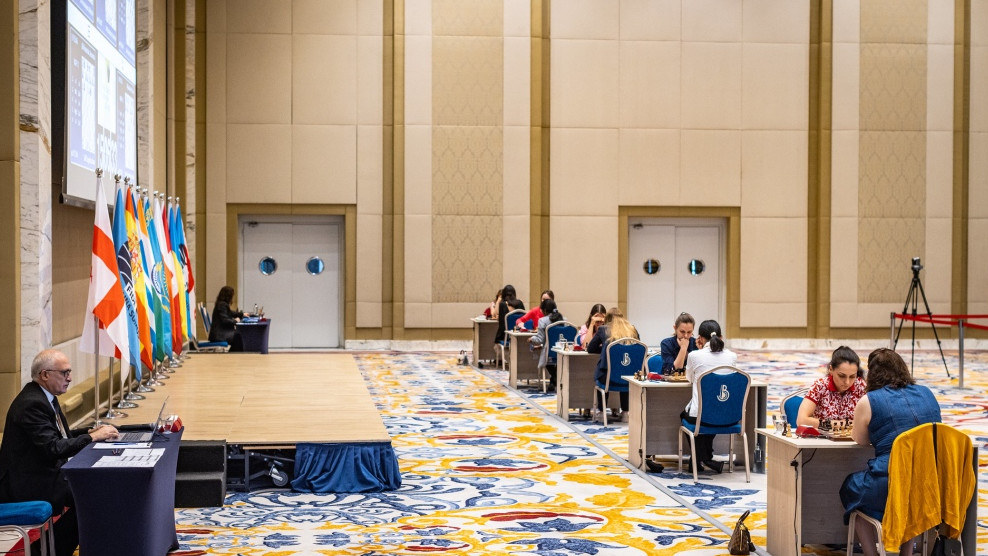
Three of the five games saw wild twists and turns, with players trading advantages, sometimes move by move. Nana Dzagnidze emerged victorious against Alexandra Kosteniuk after catching a lucky break following a daring line she chose. Vaishali Rameshbabu suffered a defeat at the hands of Mariya Muzychuk despite having a significantly better position earlier in the game. Stavroula Tsolakidou and Alina Kashlinskaya traded advantages throughout their endgame, ultimately finishing in a draw. With five rounds completed and four remaining, four players lead with three points each It was an unusual day at the Women’s Grand Prix in Georgia. Typically, players are less ambitious in their play before the rest day, as one experienced chess pundit noted before the round. This seemed to be the case initially, as most games saw rapid opening play, and the first game to finish, between Bibisara Assaubayeva and Anna Muzychuk, ended in a peaceful draw. However, as the day progressed, unexpected storms erupted on the remaining boards. The most anticipated matchup of the round was between Georgia’s Nana Dzagnidze and former Women’s World Champion Alexandra Kosteniuk. After spending considerable time in the opening, Dzagnidze opted for a risky line in the Nimzo-Indian Defense, sacrificing a bishop. Initially, this appeared to be a miscalculation: Kosteniuk, playing rapidly, seemed to be in preparation, while Dzagnidze was using up her time. However, a series of mistakes from Kosteniuk completely turned the game around, putting Dzagnidze in a winning position. Kosteniuk tried to emulate Dzagnidze’s miraculous escape against Anna Muzychuk in round four but found no such salvation this time. After misplaying advantageous positions in the earlier rounds, fortune finally favored Dzagnidze, who won the game and secured a spot among the leaders with three points. Kosteniuk, missing her chance to take sole lead, finished the first half of the tournament at 50%. A similar story unfolded in the game between Vaishali Rameshbabu and Mariya Muzychuk. In the Italian Game, both players ventured into a sharp position where Vaishali emerged with a significant advantage. However, in just a few moves, the game slipped away from her. She underestimated Black’s kingside threats and launched an attack that backfired, leading to a lost position. With this victory, Mariya Muzychuk joined the leading pack with three points, while Vaishali remains on two. The game between Stavroula Tsolakidou and Alina Kashlinskaya saw the most dramatic shifts of the day. In the Ruy Lopez, Kashlinskaya found herself in trouble during a complex middlegame and ended up in a worse position. However, as the game transitioned to an ending, Tsolakidou lost her grip, and Kashlinskaya found herself with a winning chance. Unfortunately for Kashlinskaya, she missed several opportunities to secure the win, and the game eventually ended in a draw. This was enough to keep Tsolakidou among the leaders with three points, while Kashlinskaya sits at 2.5 out of five. Round five also saw Sara Khadem win her first game of the tournament. Playing in the Exchange Variation of the Queen’s Gambit Declined, Khadem capitalized on a blunder by four-time Georgian Women’s Champion Lela Javakhishvili on move 19. Khadem played accurately thereafter, not allowing her opponent any chances to salvage a draw. This victory marks Khadem’s first in the event, though she still finds herself in last place with 1.5 points. Having been out of competitive play for more than six months, some rustiness is to be expected. Lela Javakhishvili remains on two points. With five of nine rounds played, the players will have a rest day on Tuesday before the games resume on Wednesday, August 21. Standings after Round 5 Here follows a closer look at the games of round five of the Women’s Grand Prix in Tbilisi: Nana Dzagnidze – Alexandra Kosteniuk This was the derby of the round. In the Nimzo-Indian, Nana spent a significant amount of time in the opening, deliberating whether to go for a line involving a piece sacrifice. At first glance, the position looks like a typical opening setup without much excitement. However, the main line here for White involves taking on d5, leading to a sharp game: 8.cxd5 Bxf1 9.dxe6 Ba6 10.exf7+ Kxf7 11.e4. This results in a very sharp position where White has two pawns for a piece and an attack on the black king. Other options for White include 8.b3 and 8.Qf3. After 20 minutes of contemplation, Nana decided on 8.cxd5, directly entering the piece sacrifice line. 8. cxd5 Bxf1 9.dxe6 Ba6 10.exf7+ Kxf7 Here, both 11.e4 and 11. Qb3+ continuations have been tested extensively, with the former option being considered slightly better for White. 11…Ke8 12.Ne6 According to engines, the position is now equal. Kosteniuk played very quickly, indicating this was likely part of her preparation. From here, things started to deteriorate for Nana. 12…Qd7 13.Ng7+ Kd8 White has three pawns for a piece, but the computer evaluates the position as significantly better for Black. 14.e4 Nc6 15.Be3 Na5 Here, 15…Ng4 was the engine’s first choice. 16.Qc2 At this point, Kosteniuk made two consecutive mistakes. 16…Bxa3? The first one. Alexandra should have played either 16…Kc8 or 16…Ng4 with a slightly better position. 17.Nf5 Bb4? The second mistake. Here, Kosteniuk should have played 17…Bxb2 18.Qxb2 Nxe4 19.Nxe4 Qxf5 20.Qc2 Qd5 21.f3, with the position being roughly equal. Now, White got a chance to activate her pieces and turn the tables. 18.Bg5 Rf8 19.e5 Black needed to either move her king to safety or open the c6-vent for the king. Instead, Kosteniuk made a critical error. 19…Qe6?? Again, 19…Kc8 was a better choice, although Black’s position is no joy. White is now completely winning. 20.Ne3! Be7 21.exf6 Bxf6 22.Bxf6+ Rxf6 23.b4 Nc4 24.Rxa6 Not only has White regained the bishop, but she is also a knight up. Kosteniuk continued to play, hoping to find a perpetual check. Unfortunately for her, Dzagnidze played accurately and recovered the time lost in the opening. Kosteniuk resigned on move 43. Bibisara Assaubayeva – Anna Muzychuk In the Queen’s Gambit Declined, Black started with an isolated pawn in the center.
Chairpersons and CON, EDC, VER commissions members to be elected at FIDE GA in Budapest

Dear National Federations, Dear Chess Friends, In accordance with the FIDE Charter and the FIDE Electoral Rules, the elections of the Chairpersons and members of the Verification Commission, Ethics and Disciplinary Commission and Constitutional Commission will take place at the FIDE General Assembly, on September 21, 2024, in Budapest, Hungary. We would like to kindly remind you that the candidatures for the Chairmen and the Members of the Verification Commission, Ethics and Disciplinary Commission and Constitutional Commission should reach the FIDE Offices by August 21st, 2024, 6 PM CET. Please use the following link to the Congress website General Assembly – 2024 – FIDE Congress 2024, where the relevant documents (requirements, application and nomination forms) can be obtained under General Assembly.
FIDE EDU “Preparation of Teachers” course in Budapest, Hungary, announced

Dear federation colleagues, Given the growing interest in the FIDE EDU “Preparation of Teachers” courses, we are excited to announce the 18th in-person POT course, which will be held during the 45th Chess Olympiad. Are you an aspiring or current chess educator? Prepare to enhance your chess teaching skills and earn the prestigious FIDE Schools Instructor Title at an inspiring event in Budapest, Hungary! Course Details: Dates: September 15-16 & 20-21, 2024 Location: Budapest, Hungary Seminar Language: English This exceptional 4-day seminar is an ideal opportunity for teachers, chess educators, beginner and advanced players with basic chess knowledge, and anyone with experience working with children. Engage in hands-on activities designed to integrate chess into academic settings while fostering essential 21st-century skills such as critical thinking, creativity, communication, and collaboration. Meet Our Expert Lecturers: Rita Atkins, WIM, Secretary of the FIDE Chess in Education Commission (Hungary) Anzel Laubscher, WIM, FIDE Instructor, and FIDE EDU Commission Member (South Africa) Registration Details: E-mail to register: edu.courses@fide.com Registration deadline: September 10, 2024 Fees: Seminar Fee: 150 EUR Title Fee: 50 EUR As an added benefit, successful candidates will receive lifelong access to the OPENING MASTER PREMIUM chess databases. Space is Limited—Only 30 Spots Available! We look forward to welcoming you to Budapest for a transformative educational experience!
FIDE WGP Tbilisi: Miraculous save by Nana Dzagnidze in Round 4
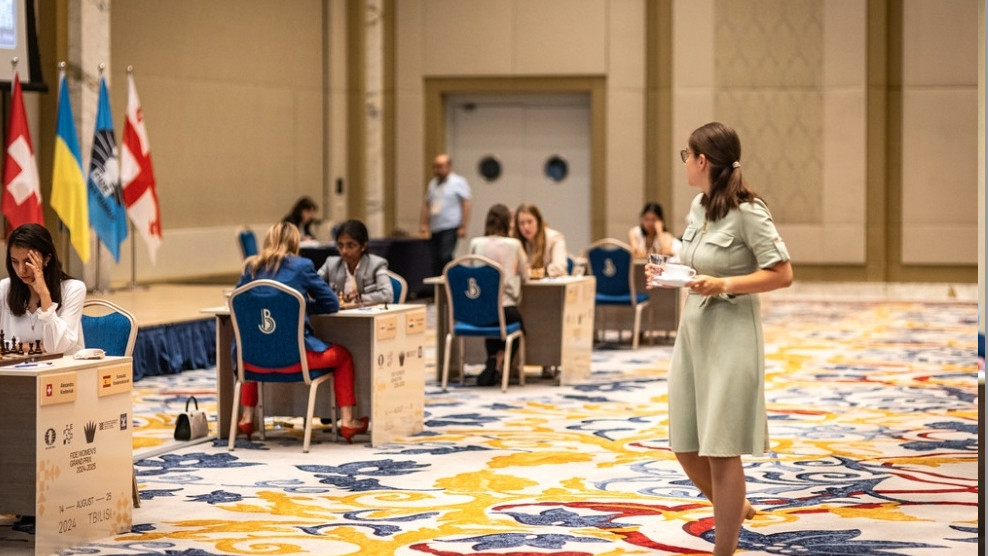
Georgia’s Nana Dzagnidze made a spectacular comeback from a completely lost position against Anna Muzychuk in a game that lasted four and a half hours and 102 moves. Meanwhile, Alexandra Kosteniuk capitalized on Sara Khadem’s error in time trouble, finding a two-move combination that secured her victory. With 2.5 points out of four, Kosteniuk joined the leaders Assaubayeva and Tsolakidou, who drew their games Round four of the Women’s Grand Prix in Georgia ended in dramatic fashion. In a tense encounter, Nana Dzagnidze managed to save a seemingly lost game against Anna Muzychuk in an unexpected twist of events. Muzychuk surprised Dzagnidze by playing a line in the French Defense she had not prepared for, and an early imprecision by Dzagnidze cost her a pawn. Although she had chances to maintain equality, a time-trouble decision to sacrifice a bishop appeared to seal her fate. Despite this, Dzagnidze refused to give up without a fight. “I tried giving as many checks as I could and then planned to resign,” she said in an interview immediately after the game. Fortune favored her when Muzychuk, under pressure, made a critical error on move 78 by pushing her a-pawn to the seventh rank, turning what should have been a win into a dead draw. Now it was Muzychuk who found herself in desperate time trouble, but she could achieve nothing more than half a point. “I feel relieved. After drawing three games where I was winning in two and better in one, this feels like payback,” Dzagnidze said. She is supported at the event by her brother, a tennis coach with little chess experience, who sat through the entire round, cheering her on. Alexandra Kosteniuk also scored an important point today. Sporting earrings resembling a chessboard, the former Women’s World Champion defeated Sara Khadem in the Scotch Game. Khadem sacrificed a pawn but had enough compensation to keep the position balanced. However, a mistake on move 31 in time trouble led to a swift defeat in just two moves. With this victory, Kosteniuk joined the leaders with 2.5/4, while Khadem, with just half a point, finds herself alone at the bottom of the standings. In a sharp Najdorf Sicilian, Mariya Muzychuk launched an aggressive kingside attack against Stavroula Tsolakidou. After Tsolakidou’s weakening move 21…g6, Muzychuk gained a strong position, with better control of the center and more active pieces. However, a misstep with 26.Na4? allowed Tsolakidou to equalize, leading to a series of exchanges that resulted in a rook endgame. Despite being a pawn up, Muzychuk was unable to convert her advantage, and the game ended in a draw. Tsolakidou now has 2.5 points out of four, while Mariya Muzychuk has two points. Alina Kashlinskaya and Bibisara Assaubayeva drew their game after around two hours of play, concluding in just 21 moves. Both players chose a sharp line in the King’s Indian Defense. In the end, Kashlinskaya had a slight initiative and an extra pawn but opted not to press further, leading to a draw. After four rounds, Bibisara has 2.5 points, while Kashlinskaya is on two. Lela Javakhishvili and Vaishali Rameshbabu drew their game in the Queen’s Gambit Declined. Despite lasting 46 moves and four and a half hours, the game remained balanced throughout, with neither side gaining a significant advantage. Both players are on two points. Standings after Round 4 Here follows a closer look at the games of round four of the Women’s Grand Prix in Tbilisi: Alexandra Kosteniuk – Sarasadat Khademalsharieh Alexandra Kosteniuk faced Sara Khadem as White in the Schmidt Variation of the Scotch Game. Khadem held her ground well against Kosteniuk for most of the game. Here, Khadem spent around thirty minutes contemplating her next move. She correctly decided to sacrifice the c7 pawn and launched a pawn advance with 15…h5, creating an escape route for her king. After 16.Qxc7 Bd5, the position remained even, with White a pawn up but Black having enough compensation to hold. However, Khadem faced one significant challenge: she was running low on time. Sensing an opportunity, Kosteniuk continued to pile on the pressure, forcing Khadem into tough decisions. Khadem managed to hold until move 31. The best defense for Black was 31…Qf6, or even moving the king to h7 with an equal position. Instead, Khadem played 31…f6??, after which Black’s position collapsed. Kosteniuk quickly found the winning combination: 32.Qa7+ Bf7 33.Bxg6!! After 33…Qxg6, 34.Rg1 would follow, and the black queen would be lost. Even a counter-sacrifice on h2 wouldn’t save Black: 33…Rxh2+ 34.Kxh2 Qh6+ 35.Kg2 Qxg6+ 36.Kf1 Qh5 37.Qg1+ and White would remain safe. With no way out, Sara Khadem resigned. Lela Javakhishvili – Vaishali Rameshbabu In the Queen’s Gambit Declined, the two players engaged in a long, steady game marked by positional maneuvering rather than drama. By move 22, they entered a rook and knight endgame. Javakhishvili offered a threefold repetition, but Vaishali declined. The knights were soon exchanged, leading to a lengthy rook endgame with considerable shuffling but little progress. The game ended in a draw. Mariya Muzychuk – Stavroula Tsolakidou In the Najdorf variation of the Sicilian, Mariya Muzychuk entered the game aggressively, leaving her king in the center while charging forward with her pawns against Black’s kingside castle. The computer suggests that Black should have played 21…a5 or 21…Bb6, but Tsolakidou opted for 21…g6?, which weakened her kingside. By the middlegame, Muzychuk had a better position with better coordinated pieces, control if the center, and the potential to apply more pressure on the board. The best way for White to proceed was to activate her king by Kf2 and reroute her knight to d4 via Ne2-d4. However, Muzychuk played 26.Na4?, effectively losing the biggest part of her advantage. After 26…Nb6, a series of exchanges followed, leading to a rook endgame where White was a pawn up but could not achieve more than a draw. Alina Kashlinskaya – Bibisara Assaubayeva In a trendy line of the King’s Indian Defense with an early h2-h4 both players aimed for a
Vaishali Rameshbabu is the only winner in Round 3 of WGP Tbilisi
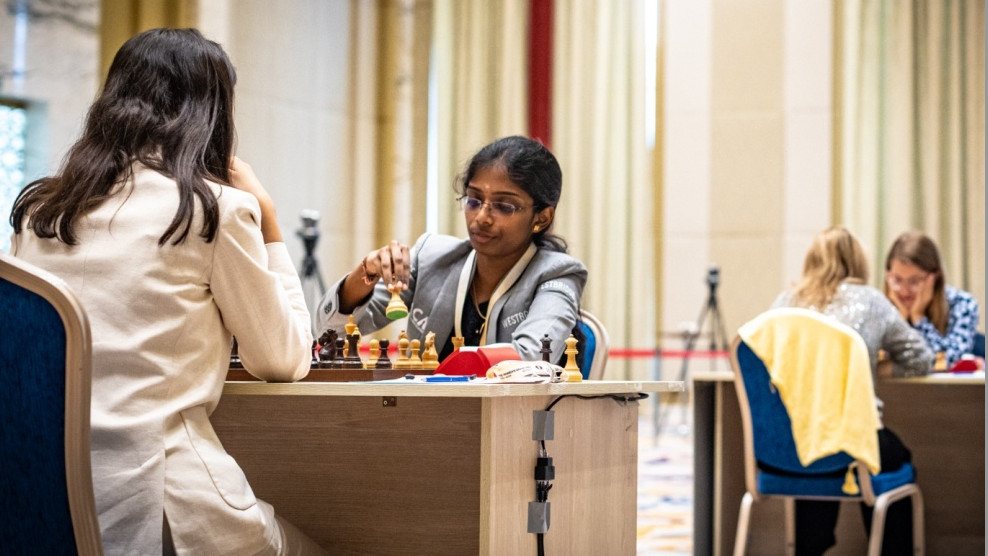
Indian star Vaishali Rameshbabu defeated Sara Khadem with the white pieces in a game she dominated from the very start. With all other games ending in draws, Stavroula Tsolakidou and Bibisara Assaubayeva lead with 2/3, followed by seven players at 50%, and Sara Khadem in last place with half a point. After blundering in round one and then letting a winning position slip away in round two against Alexandra Kosteniuk, Vaishali Rameshbabu secured a victory against Sara Khadem. In a well-executed performance in the Italian Game, Vaishali quickly gained the upper hand and gradually increased the pressure until Black had no choice but to resign. With this victory, Vaishali is on 1.5 points, back in the tournament in style. The first game to finish was between Anna Muzychuk and Alexandra Kosteniuk. In the Morphy Defense of Ruy Lopez both players castled on opposite sides, setting the stage for a potential battle. Muzychuk seemed to have a slight initiative, with Black’s queen stuck on the a7 square and potentially at risk. However, at the critical stage of the game, Muzychuk opted to exchange queens, leading to an even rook endgame. Playing the King’s Indian against Bibisara Assaubayeva, Mariya Muzychuk made a premature pawn advance on the queenside, weakening her position. Fortunately for her, Bibisara made a few inaccuracies, handing the advantage back to Black. After a tactical sequence, White ended up with a queen against two rooks, and the game was drawn. Bibisara is on 2/3, while Mariya Muzychuk has 1.5 points. Stavroula Tsolakidou drew with Lela Javakhishvili in the English Opening. The Greek player shares the lead with Assaubayeva, both on 2/3. The last game of the day to finish was between Nana Dzagnidze and Alina Kashlinskaya. In the English Defense, Kashlinskaya found herself in time trouble but managed to reach the time control and secure a draw. After failing to win significantly better positions in the first two rounds and playing another long game, the pressure is on for Nana Dzagnidze. Standings after Round 3 Here follows a closer look at the games Anna Muzychuk – Alexandra Kosteniuk This game was a clash between two experienced top-class players who have faced each other many times before. Heading into this match, the classical game score between them was 6:5 in favor of Anna Muzychuk, while they were even in Rapid, and Kosteniuk held the edge in the Blitz. In the Morphy Defense of Ruy Lopez, both players castled on opposite sides of the board, setting the stage for a potential sharp showdown. Kosteniuk initiated her attack first, launching a g5-g4 pawn push on move 12, directly challenging the safety of the white king. Muzychuk responded by reinforcing the center and preparing her own counterplay on the queenside. White just played 19.b4, exerting pressure on Black, whose queen was forced to a7. Then, something unusual happened: after 19…Bxe3, White recaptured with the queen on e3, allowing Black to exchange queens, which led to a more central position for Kosteniuk’s remaining pieces. Kosteniuk seized the opportunity and after 20.Qxe3 Qxe3 21.fxe3 Nb6 22.Nxb6 cxb6, the game transitioned into an even rook endgame, effectively defusing the tension on the board. Shortly afterward, the two players agreed to split the point. In the post-game interview, Kosteniuk mentioned that she was unsure about the strength of her position and was relieved when White opted to exchange queens. She added, “I felt I could have played better in the rook endgame,” but overall, she seemed content with her performance. Nana Dzagnidze – Alina Kashlinskaya Kashlinskaya played the English Defense against Nana Dzagnidze. The position after the opening was relatively balanced, with both sides having clear plans. White had slightly more space on the queenside and a strong central pawn on d5, while Black maintained solid central control and active pieces. Eventually, White’s d5-pawn was exchanged for Black’s pawn. Despite Kashlinskaya having an extra pawn, White’s pieces were more active. Black soon returned the extra pawn to activate her pieces. After several exchanges, the game transitioned into a queen and rook endgame. Dzagnidze, significantly better on time, sought to create threats against the Black king. Despite her time trouble, Kashlinskaya defended well and posed counter-threats, ultimately securing a draw. Bibisara Assaubayeva – Mariya Muzychuk Despite both being top players in women’s chess, this was their first classical game against each other, as noted by commentator Keti Tsatsalashvili during the coverage in Tbilisi. Muzychuk opted for the Gruenfeld Defense. The position remained balanced until Bibisara’s premature a-pawn advance weakened her queenside. 17.a4? This was a mistake. 17.Nf3 or 17. dxc5 would have been better, according to the engines. 17…Bc6 18.dxc5 Nxc5 19.Bxg7 Bxg2! 20.Nxg2? Again, White missed the better move 20. Kxg2, which would have kept the game more balanced. After 20…Kxg7, Black was clearly in a better position. Black’s pawns were better protected, and the knights were well-centralized, while White had exposed pawns on the queenside and less piece activity. Additionally, Assaubayeva was under time pressure. However, after 21. Qd4+, Black made a critical error by weakening her pawn structure and light squares with 21…f6. Following 22.Ngf4 Nde4? the position began turning in White’s favor. 23.Qc4 e5 24. b4 exf4 25. bxc5 Nxc5 26. Nxf4 It was White now who had a slightly better position. After move 33, the opponents reached the following position: The best move, according to the engines, was 34.Qb2, maintaining the tension. Instead, Bibisara opted for a tactical sequence. 34.Rxc5 bxc5 35.Ne6! Qxe6 36.cxd4, resulting in Black having two rooks for a queen. Bibisara made these moves under severe time pressure. After a few more moves, it became clear to both players that neither side could make progress, and they agreed to a draw. Stavroula Tsolakidou – Lela Javakhishvili In the English Opening, Tsolakidou, playing White, gained slightly more space on the queenside and established better control over the center, but Black countered effectively. In the middlegame, both players had one weakness each, and the position remained largely even. However, Tsolakidou was
Brazilian Chess Federation advances with bid to host 2030 Chess Olympiad in Brazil

On Wednesday, August 14, 2024, Minister of Sports André Fufuca met with the President of the Brazilian Chess Confederation (CBX), Máximo Igor Macedo, the Advisor to the President of FIDE (International Chess Federation), GM Darcy Lima, and the President of the North Rio Grande do Norte Chess Federation, Máximo Valério Macedo. The group discussed Brazil’s bid to host the Chess Olympiad in 2030, an event of immense importance on the global sports scene. The CBX announced a letter of intent highlighting interested Brazilian states and a possible shared host with Paraguay, which is already in advanced negotiations. The schedule of actions was presented to ensure a solid bid at the correspondent FIDE Congress. Minister André Fufuca acknowledged the event’s great significance and expressed his willingness to analyze the detailed CBX project, taking into account FIDE specifications. He highlighted the need for financial viability but reaffirmed the Ministry’s commitment to supporting the initiative. It will be the first time since 1978 that the Chess Olympiads will return to the American continent, making the Brazilian bid even more meaningful.
FIDE WGP Tbilisi Round 2: A day of unexpected draws
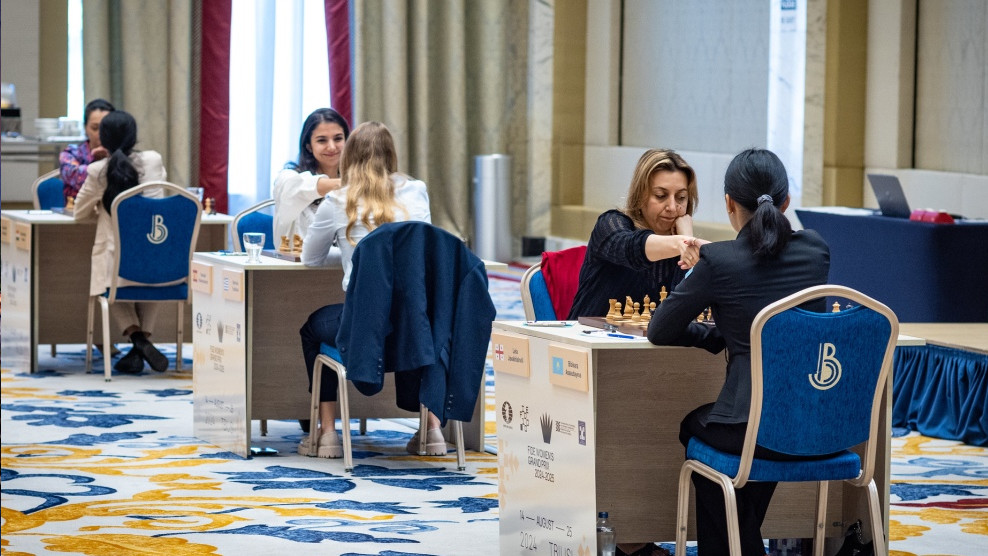
The second day of the Women’s Grand Prix Tbilisi concluded with all games ending in draws. However, in at least two of the games, one side was clearly better and on the brink of victory. After two rounds, Assaubayeva and Tsolakidou remain at the top, each with 1.5 points Vaishali Rameshbabu faced a tough challenge, playing as Black against former Women’s World Champion Alexandra Kosteniuk. After starting the tournament with a loss, Vaishali was under significant pressure on day two. Despite achieving a clearly better position as Black, she opted for a threefold repetition, giving away half a point. The biggest surprises of the day came from the two Georgian players in the tournament, both of whom dropped their winning chances. First, Nana Dzagnidze, playing Black, chose the French Defense and outplayed Mariya Muzychuk in the early stages of the game. Dzagnidze was completely winning towards the end but, in time trouble, opted for simplifications that allowed her opponent to equalize. Upon leaving the playing venue, Dzagnidze was clearly unhappy, shaking her head and remarking, “Unbelievable.” The final game of the day to finish was between Lela Javakhishvili and Bibisara Assaubayeva. Javakhishvili came out of the opening with a better position. After a few mistakes by Assaubayeva, the Georgian player was dominating both on the board and on the clock. However, Assaubayeva maintained her calm resistance, eventually making the first time control and entering a rook endgame where Javakhishvili missed several chances, allowing a draw. It was a lucky save for the Kazakh player, who, with this draw, remained in the shared first place. Sarasadat Khademalsharieh managed to stabilize after her round one loss, drawing as White with Stavroula Tsolakidou in the Nimzo-Indian. Alina Kashlinskaya and Anna Muzychuk also split the point in the Queen’s Gambit Declined, with both playing precisely and not allowing any chances. Standings after Round 2 Here is a closer look at the games from the second day of the Women’s Grand Prix: Alexandra Kosteniuk – Vaishali Rameshbabu After blundering in the first game against Stavroula Tsolakidou, India’s Vaishali Rameshbabu needed to make a comeback. However, it wasn’t going to be easy: she was playing as Black against none other than former women’s world champion Alexandra Kosteniuk. Kosteniuk opened with 1.e4, to which Vaishali responded with 1…e6, entering the Classical line of the French Defense. Vaishali made a push on the queenside and started to grow her initiative. Alexandra has just made a serious error with 29. g4 (instead of reserved 29. Bf2), which failed to a nice combination: 29…Nxe5! White now has to follow: 30.dxe5 Qxg4+ 31.Kf1? (31.Qg2 was slightly better, according to chess engines). And now, Vaishali repeated the moves: 31..Qh3+ 32.Kg1 Qg4+ 33.Kf1 Qh3+ 34.Kf1 Qg4+ Kosteniuk now called the arbiter, who confirmed the repetition. Vaishali should have continued with bringing her knight into the attack with Nh4 on moves 32, 33 and 34, followed by Kg8 with a crushing attack, but she didn’t. After the draw was agreed, the Indian player quickly exited the playing hall. Sarasadat Khademalsharieh – Stavroula Tsolakidou On the second board, Sara Khadem was White against Stavroula Tsolakidou. In the Nimzo-Indian, White was looking to make a push in the center, but Tsolakidou countered. It seemed that Black got out of the opening slightly better, but – in Tsolakidou’s own words, she “wasn’t sure how to proceed”. After exchanging heavy pieces on the kingside, the two entered an endgame with a rook and bishop each and agreed to a draw. With this draw, Tsolakidou is on 1.5/2, while Khadem got her first half a point. Lela Javakhishvili – Bibisara Assaubayeva The last game of the day to finish was between Lela Javakhishvili and Bibisara Assaubayeva. The two played for four and a half hours. In the Queen’s Gambit Declined, the position was even until move 19 when Black (Assaubayeva) made a mistake. Here, Assaubayeva had several options to maintain the balance, but decided to start rerouting her knight from a6. 19…Nc7?, undermining the threats to her king. 20.Rfe1 Nd5 Black got her knight in the center, but at what cost? She was under immense pressure, and the king’s castle was in danger. 21.Nxd5 Bxd5 22.Bxd5 cxd5 23.Qd3 (23.Rac1 might be even stronger), and White is clearly better. Black’s pieces are underdeveloped and the king’s fortress is exposed. As Assaubayeva later said in the post-game interview: “I knew I was weaker, and I tried not to make any more mistakes and see if she can beat me”. Javakhishvili also was better on the clock. Despite this, she started to struggle and could not work out the best way to convert her advantage. After exchanging several heavy pieces, White emerged with an extra pawn on the kingside but in the rook endgame that followed Assaubayeva showed more confidence in her play, bringing the game to a draw. Mariya Muzychuk – Nana Dzagnidze After letting a better position slip in round one, Nana Dzagnidze wanted to set things right in round two. It was a tough task as she was playing as Black against Mariya Muzychuk. In the second French Defence game of the round, things were largely even until move nine when White made an error and prematurely castled on the queenside handing an advantage to Black. Black has control of the center and her pieces are storming down the queenside. White tried to counter on the kingside but ended up even more exposed as Nana timely sacrificed an exchange and reached a very promising position. 10.f5 Rb811.Qe1 b5 12.f6 gxf6 13.Bh6 Kh8 14.exf6 Bxf6 15.Bxf8 Qxf8 16.Qe3 b4 17.Ne2 Black is an exchange down, but she has the initiative, while White’s pieces are still largely undeveloped. However, at this point, Nana started losing her way. 17…b3?? Keeping up the pressure with 17…a5 was the right choice. 18.cxb3 cxb3 19.a3 e5 20.Nc3? e4? Giving White some breathing space. Still, Black is better, and by move 26, she was completely winning. In this position 26…Qe8; Qe7 or Qc5 were all strong

